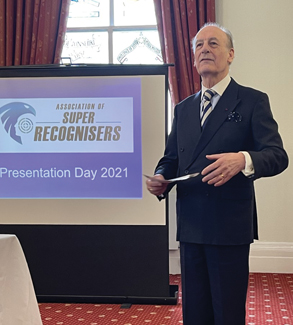Here is the latest from the Association of Super Recognisers.
It’s the professional body representing those who possess ‘Super Recogniser’ skills around the globe. Police officers from the City of London, Metropolitan, Thames Valley and West Midlands forces received awards from the Lord Lingfield, the chairman of the association. These human Super Recognisers have an innate memory for faces. In policing, Super Recognisers have found suspects and victims in several high-profile cases, including the Salisbury Novichok poisonings, the London riots of August 2011, the murder of Alice Gross and on the Hillsborough Inquiry. They have also been used to linked up to 43 volume crimes together by images. Super Recognisers, say the ASR, are the ideal people to verify automated facial recognition identifications.
Four serving officers received the highest award from the association; Honorary Fellowship. DCI Steve Jones of Thames Valley and Inspector Luke Harley of the City Police were rewarded for their enthusiasm in organising Super Recognisers in their respective forces. PCSO Andy Pope of West Midlands Police was recognised for making over 2000 (!) identifications from CCTV images; and PC Patrick O’Riordan of the Met Police was acknowledged for his work on the Grenfell Inquiry. Using his skills, Pat created a timeline of the victims as they entered the block and also produced key evidence, that helped to convict 17 fraudsters who sought to exploit the tragedy financially. Super Recognisers are exceptional at noting who is in footage, as well as those who are not.
Seven Thames Valley Police super recognisers, including PC Lucy Fleming, the highest scorer on the University of Greenwich tests, received their Licentiate certificates. In addition to being tested on their abilities relating to short and long term memory, image matching and spotting faces in a crowd, these officers completed a course covering operational Super Recogniser tactics, with relevant legislation. This included identification, data protection, Human Rights and surveillance laws and Codes of Practice. Spotting suspicious behaviour was also covered.
Prof Josh Davis, the Greenwich University psychologist, and the academic expert in this field, noted that “police forces would benefit from establishing which of their officers have the super recogniser skill. This would enable them to solve more crimes and make communities safer.”
Lord Lingfield, pictured, added: “It was wonderful to present certificates to the police officers, who had completed the Super Recogniser course. I especially congratulate those awarded Honorary Fellowship. They have done much to drive super recognition forward.”










